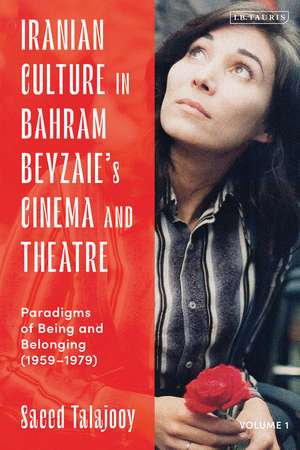Iranian Culture in Bahram Beyzaie’s Cinema and Theatre: Paradigms of Being and Belonging (1959-1979)
Autor Saeed Talajooyen Limba Engleză Hardback – 19 apr 2023
Preț: 540.96 lei
Preț vechi: 629.02 lei
-14% Nou
Puncte Express: 811
Preț estimativ în valută:
103.52€ • 108.57$ • 86.17£
103.52€ • 108.57$ • 86.17£
Carte tipărită la comandă
Livrare economică 01-15 aprilie
Preluare comenzi: 021 569.72.76
Specificații
ISBN-13: 9780755648665
ISBN-10: 0755648668
Pagini: 288
Ilustrații: 45 bw illus
Dimensiuni: 156 x 234 mm
Greutate: 0.58 kg
Editura: Bloomsbury Publishing
Colecția I.B.Tauris
Locul publicării:London, United Kingdom
ISBN-10: 0755648668
Pagini: 288
Ilustrații: 45 bw illus
Dimensiuni: 156 x 234 mm
Greutate: 0.58 kg
Editura: Bloomsbury Publishing
Colecția I.B.Tauris
Locul publicării:London, United Kingdom
Caracteristici
Offers examples of how intercultural reformulation and intercultural cross-pollination enable creative artists to develop emancipatory forms that offer alternative histories.
Notă biografică
Saeed Talajooy is Lecturer in Persian at the University of St Andrews, UK. His publications include chapters on Iranian theatre and cinema, articles on Bahram Beyzaie's cinema and theatre, the co-edited volume, Resistance in Contemporary Middle Eastern Studies: Literature, Cinema and Music (2012) and a Special Issue of Iranian Studies on Bahram Beyzaie.
Cuprins
1. Bahram Beyzaie's Contour in Time: A Theory of Creativity2. The Puppet Trilogy (1962-3): Beyzaie's Deconstruction of the Hero/Villain Binary3. Uncle Moustache (1970): Beyzaie's Carnivalesque Deconstruction of Hegemonic Masculinity4. Downpour (1971-2): The Creative Intellectual and the Meta-Cinematic Subversion of Hegemonic Masculinity5. The Journey (1972): A Sisyphean Quest for Belonging in a World of Toxic Masculinity6. The Stranger and the Fog (1974): Rituals of Existence: Homecoming, Becoming and Departing7. The Crow (1977): City, Home, and the Pitfalls of Iranian Modernity8. Conclusion: The Revolution and the End of an Era
Recenzii
This book offers a remarkably rich analysis of the works of one of Iran's most renowned playwrights and filmmakers, Bahram Beyzaie. Focused on Beyzaie's oeuvre between 1959 and 1979, this unparalleled work of scholarship is indispensable for understanding Beyzaie's unique engagement with and critique of modernity in the Iranian cultural context.
